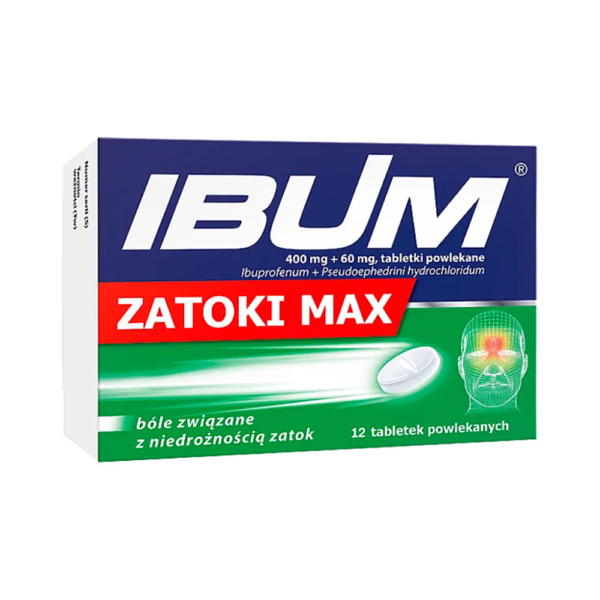IBUM Zatoki Max in tablets shows the combined effect of two ingredients: ibuprofen, belonging to non-steroidal anti-inflammatory drugs (NSAIDs) and pseudoephedrine, which is a sympathomimetic drug. Ibuprofen has analgesic, antipyretic and anti-inflammatory effects. Pseudoephedrine is a drug that reduces congestion of the mucous membranes of the upper respiratory tract. Clears the nose and side sinuses, reduces the amount of secretions.
Symptoms
The drug is intended for emergency use to relieve the symptoms of nasal and paranasal sinus obstruction accompanied by headache, pain associated with sinus obstruction and fever in the course of flu or cold.
If you do not feel better or if you feel worse after 3 days, contact your doctor.
Active substance: Ibuprofen, Pseudoephedrini hydrochloridum
Composition
| 1 tablet of Ibum Gulf Max contains: | 400 mg of ibuprofen |
| 60 mg pseudoephedrine hydrochloride | |
| The other ingredients (excipients) are: lactose monohydrate, microcrystalline cellulose, silicated microcrystalline cellulose (a mixture of microcrystalline cellulose and colloidal anhydrous silica), sodium starch glycolate (type A), colloidal anhydrous silica, magnesium stearate and Opadry II 85 F1 84 22 White coating. | |
| Coating composition: polyvinyl alcohol, macrogol 3350, talc, titanium dioxide (E 171) |
Dosage
Always take this medicine exactly as described in the package leaflet or as your doctor or pharmacist has told you. Check with your doctor or pharmacist if you are not sure.
The drug is administered orally. The recommended dose is:
Adults and adolescents over 12 years: 1 tablet every 4 hours after meals. Do not take more than 3 tablets a day (maximum daily dose of 1200 mg ibuprofen and 180 mg pseudoephedrine hydrochloride in divided doses).
The single dose should be reduced to ½ tablet if it is sufficient to relieve symptoms.
Elderly: No dose adjustment is required unless renal or hepatic function is impaired. If there are kidney or liver problems, the doctor should determine the dosage individually.
The lowest effective dose should be used for the shortest duration to relieve symptoms. This reduces the risk of side effects.
A doctor should be consulted if treatment is required for more than 3 days or if symptoms worsen.
When not to use IBUM Zatoki Max?
- If you are allergic to ibuprofen, pseudoephedrine or any of the other ingredients of this medicine,
- in patients who have ever experienced allergic symptoms in the form of rhinitis, urticaria or bronchial asthma after taking acetylsalicylic acid or other non-steroidal anti-inflammatory drugs,
- in patients with active or previous gastric and / or duodenal ulcer, perforation (perforation) or bleeding, also occurring after the use of NSAIDs,
- in patients with bleeding diathesis (bleeding tendency),
- in patients with severe hepatic insufficiency, severe renal insufficiency or severe heart failure,
- Pregnant,
- during breastfeeding,
- in patients with severe disorders of the cardiovascular system, tachycardia (increased heart rate), hypertension, angina pectoris,
- in patients with urinary retention,
- in patients with hyperthyroidism,
- in patients with narrow-angle glaucoma,
- in patients who have had a history of haemorrhagic stroke or have risk factors that may increase the risk of haemorrhagic stroke, for example by taking vasoconstrictors or other decongestants by mouth or nose.
Contents
Ibum Sinus Max film-coated tablets are white, oval biconvex with a score line on both sides.
One pack of the drug contains 12 film-coated tablets in a cardboard box.
Storage method
Below 25°C
Manufacturer
HASCO-LEK
Warnings
Talk to your doctor or pharmacist before using Ibum Sinus Max. Particular care should be taken when using Ibum Sinus Max in patients:
- with systemic lupus erythematosus and mixed connective tissue disease – due to the increased risk of developing aseptic meningitis,
- with diseases of the gastrointestinal tract (ulcerative colitis, Leśniowski and Crohn’s disease) – due to the possibility of exacerbation of the disease,
- with impaired kidney function – due to the risk of further deterioration of kidney function,
- have liver problems
- with heart rhythm disorders, with hypertension, myocardial infarction or heart failure in the history,
- with active or history of bronchial asthma and allergic diseases – due to the possibility of bronchospasm,
- in the elderly – due to the risk of increased side effects,
- taking medicines listed in the section “Ibum Zatoki Max and other medicines”,
- with diabetes,
- with benign prostatic hyperplasia,
- with glaucoma,
- with pyloric stenosis,
- with bladder neck obstruction,
- concomitantly taking other NSAIDs, including COX-2 inhibitors (increased risk of side effects).
Patients with a history of hypertension and/or heart failure should take special care and consult their doctor or pharmacist before taking this medicine, as fluid retention, hypertension and edema have been reported in association with NSAID treatment.
Taking anti-inflammatory/painkillers such as ibuprofen may be associated with a slightly increased risk of heart attack or stroke, particularly when taken in high doses. Do not exceed the recommended dose and duration of treatment.
Before using Ibum Zatoki Max, the patient should discuss treatment with a doctor or pharmacist if:
- you have heart problems such as heart failure, angina (chest pain), you have had a heart attack, bypass surgery, you have peripheral arterial disease (poor blood circulation in the legs due to narrow or blocked arteries) or if you have had any kind of stroke (including mini-stroke or transient ischemic attack (TIA))
- you have high blood pressure, diabetes, high cholesterol, a family history of heart disease or stroke, or if you are a smoker.
There is a risk of gastrointestinal haemorrhage, ulceration or perforation, which can be fatal and may not necessarily be preceded by warning symptoms or may occur in patients with such warning symptoms. In the event of bleeding or ulceration of the gastrointestinal tract, stop taking the drug immediately and contact your doctor. Patients with a history of gastrointestinal disease, especially the elderly, should inform their physician of any unusual gastrointestinal symptoms (especially bleeding), especially at the beginning of therapy. Such patients should use the lowest dose possible.
Caution should be exercised in patients taking concomitant medications that may increase the risk of gastrointestinal disorders or bleeding, such as corticosteroids or anticoagulants such as warfarin (acenocoumarol) or antiplatelet agents such as acetylsalicylic acid.
Concomitant, long-term use of painkillers may lead to kidney damage with the risk of kidney failure (post-analgesic nephropathy).
Serious skin reactions, some of them fatal, including exfoliative dermatitis, Stevens-Johnson syndrome and toxic epidermal necrolysis, have been reported very rarely with the use of NSAIDs. The greatest risk of these serious reactions is at the beginning of therapy, in most cases within the first month of treatment. Discontinue use at the first appearance of skin rash, mucosal lesions or other signs of hypersensitivity.
As with other central nervous system stimulants, there is a risk of abuse when using pseudoephedrine. When using increased doses, toxic effects may occur. Long-term use may lead to tachyphylaxis (loss of sensitivity to the drug) with an increased risk of overdose. Depression may occur after abrupt discontinuation of the drug.
The drug should be used with caution in patients taking tricyclic antidepressants and other sympathomimetic drugs (drugs that decongest the blood vessels of the mucous membranes), appetite suppressants, amphetamine-like psychotropic drugs.
Elderly patients
The elderly have an increased risk of side effects. To reduce the risk of side effects, the medicine should be taken for the shortest duration necessary to relieve symptoms.
Note for athletes: after using pseudoephedrine, a positive test result for taking doping substances may occur.
Consult your doctor even if the above warnings apply to situations in the past .
Pregnancy and breastfeeding
If you are pregnant or breast-feeding, think you may be pregnant or are planning to have a baby, ask your doctor or pharmacist for advice before taking this medicine.
The use of Ibum Zatoki in pregnant and lactating women is contraindicated.
Interactions with other drugs
Tell your doctor or pharmacist about all the medicines you are taking, have recently taken, or plan to use.
Ibum Zatoki Max can affect the way other medicines work, or other medicines can affect how Ibum Zatoki Max works. For example:
- anticoagulants (thinning the blood and preventing blood clots, such as aspirin – acetylsalicylic acid, warfarin, ticlopidine);
- acetylsalicylic acid, other non-steroidal anti-inflammatory drugs or corticosteroids (e.g. prednisolone or dexamethasone); the use of these drugs in combination with ibuprofen may increase the risk of gastrointestinal side effects;
- medicines that lower blood pressure (ACE inhibitors such as captopril, beta blockers such as atenolol, angiotensin II receptor antagonists such as losartan);
- antihypertensives and diuretics: ibuprofen (like other NSAIDs) may reduce the effect of these drugs;
- lithium (antidepressant): there is evidence of a potential increase in lithium plasma concentrations when ibuprofen is taken concomitantly (as with other non-steroidal anti-inflammatory drugs);
- methotrexate (antineoplastic drug): there is a risk of increasing the concentration of methotrexate in the blood plasma when ibuprofen is used concomitantly (as with other non-steroidal anti-inflammatory drugs);
- zidovudine (an antiviral medicine): there is evidence of an increased risk of joint haemorrhage and hematoma in haemophiliac HIV-positive patients taking zidovudine and ibuprofen concomitantly;
- antacids increase the rate of pseudoephedrine absorption, and kaolin decreases the rate of pseudoephedrine absorption.
Also some other medicines may be affected or affect the treatment of Ibum Sinus Max.
Therefore, always consult your doctor or pharmacist before taking Ibum Sinus Max with other medications.
Ibum Sinus Max should not be used simultaneously with the following drugs:
- monoamine oxidase inhibitor and for up to 14 days after stopping taking this inhibitor. Hypertensive crises may occur during concomitant use of a monoamine oxidase inhibitor and sympathomimetic drugs.
Due to the increased risk of vasoconstriction and increased blood pressure, the concomitant use of Ibum Sinus Max (due to the content of pseudoephedrine) with the following drugs is not recommended:
- dopamine receptor agonists, ergot alkaloid derivatives – bromocriptine, cabergoline, lisuride, pergolide;
- dopaminergic vasoconstrictors – dihydroergotamine, ergotamine, methylergometrine;
- linezolid;
- nasal decongestants (oral or nasal) – phenylephrine, ephedrine, phenylpropanolamine.
The following drugs are not recommended to be used concomitantly with pseudoephedrine:
- appetite suppressants (pseudoephedrine may increase their effect);
- amphetamine-type psychostimulants (pseudoephedrine may increase their effect);
- antihypertensives, alpha-methyldopa, mecamilamine, reserpine, hellebore alkaloids, guanethidine (pseudoephedrine may reduce their antihypertensive effect);
- tricyclic antidepressants (pseudoephedrine may theoretically increase the risk of high blood pressure and heart rhythm disorders).
When halogenated gases, general inhalation anesthetics, are used in combination with pseudoephedrine, an acute hypertensive reaction in the perioperative period may occur, as when these drugs are used in combination with other indirect sympathomimetic agents. Therefore, it is recommended to discontinue Ibum Zatoki Max 24 hours before the planned general anesthesia.
Potential side effects of IBUM Zatoki Max
Like all medicines, this medicine can cause side effects, although not everybody gets them.
Uncommon (1 to 10 patients in 1,000):
- headache, indigestion, abdominal pain, nausea, hives and itching.
Rare (1 to 10 patients in 10,000):
- diarrhoea, flatulence, constipation, vomiting, gastritis, dizziness, insomnia, agitation, irritability and tiredness
- edema resulting from disorders of the kidneys and urinary tract.
Very rare (affects less than 1 user in 10,000):
- tarry stools, haematemesis, ulcerative stomatitis, exacerbation of colitis and Crohn’s disease
- gastric and/or duodenal ulcers, gastrointestinal bleeding and perforation, sometimes fatal, especially in the elderly
- in isolated cases, depression, psychotic reactions and tinnitus, sterile meningitis have been reported
- dysuria (difficulty urinating), decreased urine output, renal failure, renal papillary necrosis, increased serum urea
- hepatic impairment, especially with long-term use
- blood count abnormalities (anaemia – anemia, leukopenia – a decrease in the number of white blood cells, thrombocytopenia – a decrease in the number of platelets, agranulocytosis – a decrease in the number of granulocytes). The first symptoms are: fever, sore throat, superficial ulceration of the oral mucosa, flu-like symptoms, fatigue, bleeding (e.g. bruises, petechiae, purpura, nosebleeds)
- erythema multiforme, Stevens-Johnson syndrome, toxic epidermal necrolysis
- severe hypersensitivity reactions such as swelling of the face, tongue and larynx, shortness of breath, tachycardia (increased heart rate), hypotension (sudden decrease in blood pressure), shock, exacerbation of asthma and bronchospasm
- in patients with pre-existing autoimmune diseases (systemic lupus erythematosus, mixed connective tissue disease) isolated cases of aseptic meningitis symptoms such as stiff neck, headache, nausea, vomiting, fever, confusion have been reported during treatment with ibuprofen.
Oedema, hypertension and heart failure have been reported in association with treatment with NSAIDs at high doses. Medicines such as Gum Ibum may be associated with a slightly increased risk of heart attack (myocardial infarction) or stroke.
Side effects resulting from the presence of pseudoephedrine in the drug:
indigestion, gastrointestinal disorders, redness and rashes, nausea, vomiting, excessive sweating, dizziness, thirst, tachycardia (increased heart rate), arrhythmias, anxiety, insomnia, rarely – uncontrolled urination, muscle weakness, tremors , anxiety, confusion, thrombocytopenia.




Reviews
There are no reviews yet.